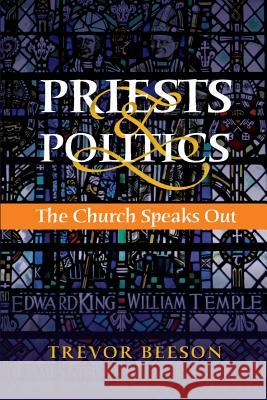Priests and Politics: The Church Speaks Out » książka
Priests and Politics: The Church Speaks Out
ISBN-13: 9780334046578 / Angielski / Miękka / 2013 / 256 str.
Since Christianity is an ethical as well as a mystical religion and since individuals live in communities, the church is bound to be involved in politics and other social action that determines the quality of human life. So argues Trevor Beeson in this study of how the Church of England's leaders responded to the radical social changes that transformed life in Britain during the nineteenth and twentieth centuries. Their response was never prompt and rarely enthusiastic, and all too often the bishops resisted change in society as well as in the church. Nonetheless there were always a few prophets who recognised the need for reform and sometimes led the way to its realisation. Trevor Beeson traces the course of a fascinating period of history, starting from the time when church and state were bonded in an all-embracing unity, then moving through turbulent and and sometimes violent times in which the church struggled to discover a new vocation. Trevor Beeson analyses 18 key issues of the period in his usual robust style together with pen-portraits of the leading figures involved.. He ends with a critical evalualtion of the performances of some recent church leaders and outlines what he believes to be the appropriate basis for the intervention of bishops and other clergy in an increasingly secularised society that no longer recognises their authority. The duty to make pronouncements of Christian principle remains but these must normally point decision-makers in constructive directions rather than offering directives for the solutions of complex social and economic problems.
Since Christianity is an ethical as well as a mystical religion and since individuals live in communities, the church is bound to be involved in politics and other social action that determines the quality of human life. So argues Trevor Beeson in this study of how the Church of Englands leaders responded to the radical social changes that transformed life in Britain during the nineteenth and twentieth centuries.Their response was never prompt and rarely enthusiastic,and all too often the bishops resisted change in society as well as in the church. Nonetheless there were always a few prophets who recognised the need for reform and sometimes led the way to its realisation. Trevor Beeson traces the course of a fascinating period of history, starting from the time when church and state were bonded in an all-embracing unity, then moving through turbulent and and sometimes violent times in which the church struggled to discover a new vocation. Trevor Beeson analyses 18 key issues of the period in his usual robust style together with pen-portraits of the leading figures involved.. He ends with a critical evalualtion of the performances of some recent church leaders and outlines what he believes to be the appropriate basis for the intervention of bishops and other clergy in an increasingly secularised society that no longer recognises their authority.The duty to make pronouncements of Christian principle remains but these must normally point decision-makers in constructive directions rather than offering directives for the solutions of complex social and economic problems.











